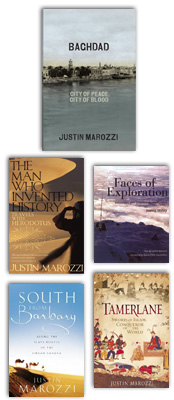| After more than 40 years of life under Muammar Gaddafi, some hope that a member of the old royal family might have a place in Libya’s future.
It was not the sort of welcome I was expecting. After 19 hours in the back of a flimsy Hyundai saloon, flying along at top speed with a driver distracted by two mobile phones, I was hoping for something a little friendlier. But Sheikh Mohammed Sanusi, the local imam in Jaghbub – a tiny desert oasis in eastern Libya – is in an uncompromising mood. “I’m angry with Christians and Jews,” he begins. “Why’s that?” I ask, slightly taken aback. |
|
“Because the Christian and Jewish holy books have been changed many times over the centuries,” he says. “The Koran has been unaltered for 1,400 years. You should read the Koran, become a Muslim and earn your place in paradise.”
I try to change the conversation but the sheikh is having none of it. Obstinately he sticks to his guns, relating various miracles and prophesies of the Prophet Mohammed. It is hard to get a word in edgeways.
Monarchy
My mission is not so much to discuss religion, as to see what, if anything, is left of the famous Sanusi Order that once held sway here.
The Order was an Islamic revivalist movement of orthodox sufis, established in the Arabian desert by Sheikh Mohammed ibn Ali Sanusi – aka the Grand Sanusi – in 1837.
It spread right across north Africa and went as far west as Senegal through a network of zawiyas, or religious lodges.
In 1856, the Grand Sanusi founded a zawiya in Jaghbub, which grew to become the headquarters of the Order and Africa’s second-greatest university after al-Azhar in Cairo.
When Libya achieved independence under a constitutional monarchy in 1951, it was no coincidence that a member of the Sanusi family – Idris – became king.
The family and the Order had won lasting respect by providing education to the masses and mediating difficult local tribal and trade disputes.
The Idris monarchy proved a benign institution for Libya during its 18 years, though nationalist detractors criticised it for being ineffectual and too pro-Western.
Muammar Gaddafi toppled King Idris in 1969 and sought to marginalise the Sanusis with a vengeance.
Idris’s heir and his family were first imprisoned then sent into exile in London, having been forced to watch their house being burnt to cinders by the regime.
Destruction
Then, in 1988, Gaddafi sent the bulldozers into Jaghbub and the great zawiya was razed to the ground.
“It took 11 days for them to destroy it,” Sheikh Mohammed says, as if it was yesterday.
“Then they finished it off with 17 explosions.”
He takes me outside and we walk across a vast expanse of rubble, sizzling beneath the white desert sun. There are 47,000 sq metres (506,000 sq ft) of smashed marble, white stone, date-palm trunks and rusting wires and nails.
Nothing within the old compound remains standing.
The destruction of such an important part of Libya’s cultural heritage is all the more chilling for being left as it is.
Yet with Gaddafi now gone from eastern Libya, it cannot be too long before the bulldozers return to Jaghbub and the great zawiya rises from the ashes.
The sheikh says he is not interested in discussing Gaddafi or the Libyan revolution. His only interest is in God.
The one concern he does express – probably unique in any commentary on the Arab Spring to date – is this: if the violence in the region continues, so many men will lose their lives that the ratio of women to men will increase to 50:1. This, he says, will lead to outbreaks of lesbianism and same-sex marriages that will represent a real problem for Muslim society. The translator, entirely deferential up to this point, looks a little embarrassed.
Political prisoner
However hard he tried to crush the Sanusis, Col Gaddafi could never completely erase the family and their followers from Libya and Libyan history.
Today the Sanusi story continues in Benghazi, where Ahmed al-Zubair Ahmed al-Sanusi is a member of the Transitional National Council. Now 77, he was the world’s longest-serving political prisoner, languishing behind bars from 1970 to 2001, four years more than Nelson Mandela. During that time, Gaddafi never commuted the death sentence that hung over him.
“Every time a door opened, I never knew if it was going to be someone taking me to my execution,” he says.
Dignified and quietly spoken in a pinstripe suit and tie, he talks without rancour, resolutely upbeat about the formidable challenges ahead.
There are few demands for the monarchy to be restored. But amid the confusion and euphoria in Benghazi, some Libyans look at Haj Ahmed and dare to wonder whether, after almost 42 years of dictatorship, the Sanusi name may yet return to the fore.

